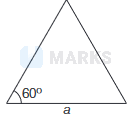Search any question & find its solution
Question:
Answered & Verified by Expert
The sides of an equilateral triangle are increasing at the rate of \(2 \mathrm{~cm} \mathrm{~s}^{-1}\). How fast does its area increase when its side is \(10 \mathrm{~cm}\) ?
Options:
Solution:
2421 Upvotes
Verified Answer
The correct answer is:
\(10 \sqrt{3} \mathrm{~cm}^2, \mathrm{~s}^{-1}\)

Area of an equilateral triangle is,
\(A=\frac{\sqrt{3} a^2}{4}\)
Differentiating with respect to time we get,
\(\Rightarrow \quad \frac{d A}{d t}=\frac{\sqrt{3}}{4} \times 2 a \cdot \frac{d a}{d t}\)
Here, \(\frac{d a}{d t}=2 \mathrm{~cm}^{-1}\) when \(a=10 \mathrm{~cm}\)
So, \(\left.\frac{d A}{d t}\right|_{a=10 \mathrm{~cm}}=\frac{\sqrt{3}}{4} \times 2 \times 10 \times 2\)
\(=10 \sqrt{3} \mathrm{~cm}^2 \cdot \mathrm{s}^{-1}\)
Looking for more such questions to practice?
Download the MARKS App - The ultimate prep app for IIT JEE & NEET with chapter-wise PYQs, revision notes, formula sheets, custom tests & much more.